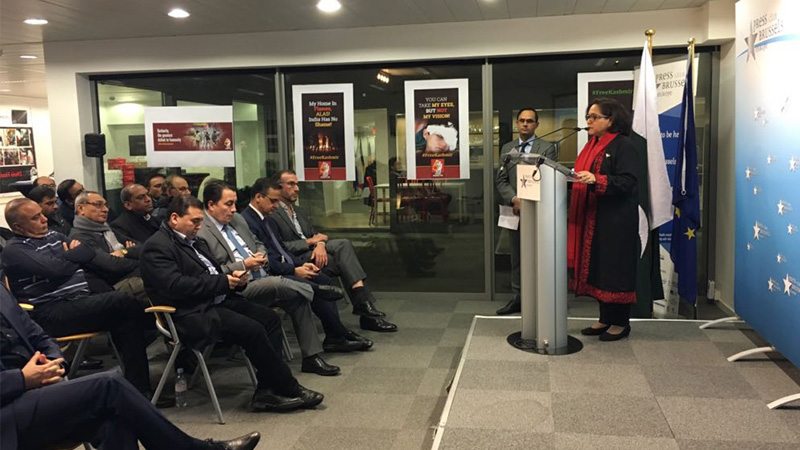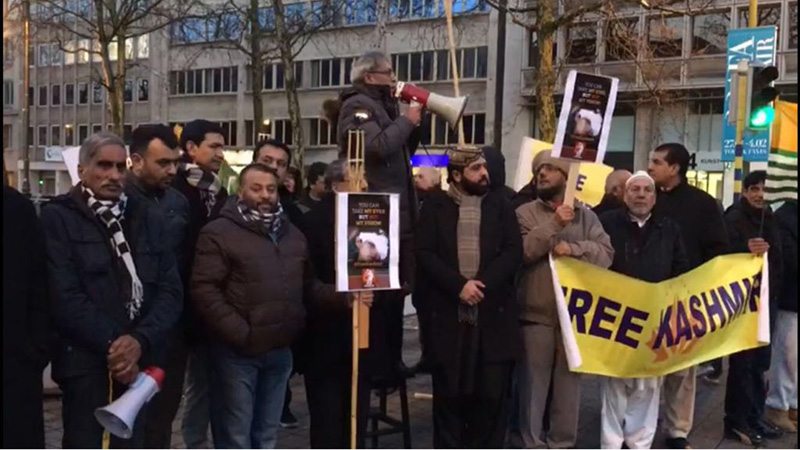
BRUSSELS: Pakistan Ambassador to European Union Naghmana Hashmi has said that India has unleashed unprecedented scale of torture and human rights violations in Indian-held Kashmir and that’s why it is denying any independent evaluation of the situation because it has got much to hide from the world.
She was addressing an event organised by the Embassy of Pakistan at Brussels Press Club to mark Kashmir Day in solidarity with the citizens of Indian occupied Kashmir.
A number of dignitaries and rights activists, including Brussels Parliament Vice President Emin Ozkara, members Brussels Parliament Prof Hasan Koyunchu and Dr Manzoor Zahoor, Senator Bertin Mampaka, Councilor Shazia Manzoor, Kashmir Council Chairman Ali Raza Syed and Professor Dr Alexdre Thys participated in the event.
Hashmi said that India wanted to suppress the voice of Kashmiris through horrible methods such as use of pellet guns and persecution of Kashmiri leaders. “Unprecedented use of pellet guns has blinded more than 200 people, including women and young children, depriving them of any chance of leading a fulfilling life. The Hurriyat leaders are being harassed on trumped up charges,” she stated.
She added that India had got a lot to hide from the international community and that’s why they did not allow visits from any independent bodies in the occupied valley.
“India refused to allow the visit of the team of the office of higher commissioner for human rights and the Independent Permanent Commission of Human Rights of OIC to Held Kashmir; thus denying the international community an opportunity to evaluate the situation on ground,” she asserted.
Member of European Parliament and EU’s Delegation for Relations with the countries of South Asia Jean Lambert said that the world was already aware of heavy militarisation and human rights issues in Indian-held Kashmir but damage done to a range of people, including students and children was leading even the Indian security personnel to raise serious questions.
She said that pellet gun injuries were doing severe damage to the people, especially with the risk of losing their eye-sight, and this is the message given by the authorities to the people that they can face such atrocities if they come out to protest against the government policies.
“We are joining with Amnesty International to urge a rethink on the use of pellet guns. And we want to join the campaign to urge the chief minister of the area to actually get these items removed from law enforcement in Kashmir,” MEP Lambert added.
She said that under the UN principles on how to deal with firearms, the issue is to minimize harm. She added that there are other ways of policing in which the authorities can avoid harm and injury to protesters, which is certainly not this randomized way of using pellet guns.
Prof Hasan Koyunchu added that use of pellet guns against protestors was in clear violation of international law and international treaties. He added that law enforcers use rubber bullets if they must against the protestors but here they are using iron bullets and that also without any trajectory, which means they could hurt people indiscriminately, which sometimes results into the injuries of their policemen present in the range of pellet guns.
Meanwhile, Kashmir Council Europe organized a candlelight vigil in Brussels to show solidarity with Kashmiris new the Belgium Prime Minister House. A number of citizens mostly of Paksitani and Kashmiri origin joined the vigil to condemn the unprecedented use of violence by Indian forces in the occupied Kashmir.
The vigil was led by the Kashmir Council chairman Ali Raza Syed who accused Indian forces of committing genocide of Kashmiris while paying rich tribute to the brave people of the valley who were continuing their freedom struggle under such inhumane conditions.
He said that the world should stand by the Kashmiris who are peacefully continuing their struggle for self-determination, as promised by the international community.
Published in Daily Times, February 6th 2018.
